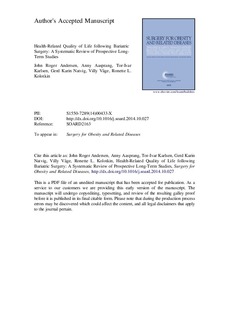| dc.contributor.author | Andersen, John Roger | |
| dc.contributor.author | Aasprang, Anny | |
| dc.contributor.author | Karlsen, Tor-Ivar | |
| dc.contributor.author | Natvig, Gerd Karin | |
| dc.contributor.author | Våge, Villy | |
| dc.contributor.author | Kolotkin, Ronette Loganzo | |
| dc.date.accessioned | 2015-02-16T07:30:41Z | |
| dc.date.accessioned | 2015-09-17T10:08:37Z | |
| dc.date.available | 2015-02-16T07:30:41Z | |
| dc.date.available | 2015-09-17T10:08:37Z | |
| dc.date.issued | 2014 | |
| dc.identifier.citation | Andersen, J. R., Aasprang, A., Karlsen, T.-I., Natvig, G. K., Våge, V. & Kolotkin, R. L. (2014). Health-related quality of life after bariatric surgery: a systematic review of prospective long-term studies. Surgery for Obesity and Related Diseases, 11(2), 466-473. doi: | |
| dc.identifier.issn | 1550-7289 | |
| dc.identifier.uri | http://hdl.handle.net/11250/300487 | |
| dc.description | Author´s accepted manuscript | |
| dc.description.abstract | Impaired health-related quality of life (HRQoL) is common in bariatric surgery candidates and is often one of the motivating factors for seeking bariatric surgery. Although many studies have reported changes in HRQoL after bariatric surgery, few are long-term prospective studies and no systematic review has been conducted. A systematic database search identified studies reporting HRQoL preoperatively and ≥ 5 years after bariatric surgery. Change in HRQoL over time was the outcome variable, divided into primary and secondary outcomes. Seven prospective cohort studies met the inclusion criteria. Eight HRQoL measures and six surgical methods were identified. Longterm follow-up time ranged from 5-10 years, sample sizes from 44 to 655 patients, and follow-up rates from 61 to 92%. None of the seven studies were randomized controlled trails and only two studies used control groups. Six out of seven studies showed statistically significant improvements in all of the primary outcomes, while one study showed statistically significant improvements in one of two primary outcomes. Of the statistically significant HRQoL improvements, 92 percent were clinically meaningful. Peak improvements in primary HRQoL outcomes were typically observed during the first years of follow-up, followed by a gradual decline that seemed to stabilize five years postoperatively. Long-term HRQoL scores typically remained improved relative to preoperative scores but were somewhat below population norm scores. In conclusion, while bariatric surgery candidates reported impaired HRQoL pre-surgically, their HRQoL improved considerably after bariatric surgery and much of the initial HRQoL improvements were maintained over the long term. | |
| dc.language.iso | eng | |
| dc.publisher | Elsevier | |
| dc.rights | Attribution-NonCommercial-NoDerivatives 4.0 Internasjonal | |
| dc.rights.uri | http://creativecommons.org/licenses/by-nc-nd/4.0/deed.no | |
| dc.title | Health-Related Quality of Life following Bariatric Surgery : A Systematic Review of Prospective Long- Term Studies | |
| dc.type | Journal article | |
| dc.type | Peer reviewed | |
| dc.date.updated | 2015-02-16T07:30:41Z | |
| dc.source.pagenumber | 466-473 | |
| dc.source.volume | 11 | |
| dc.source.journal | Surgery for Obesity and Related Diseases | |
| dc.source.issue | 2 | |
| dc.identifier.doi | 10.1016/j.soard.2014.10.027 | |
| dc.identifier.cristin | 1179018 | |

